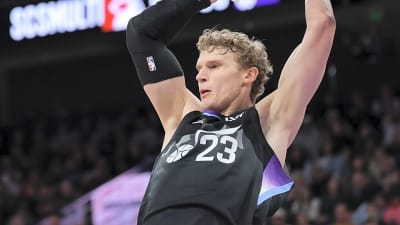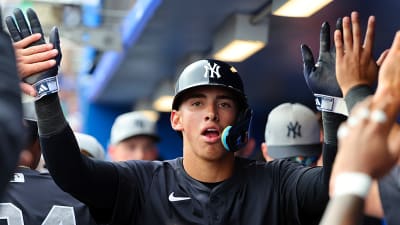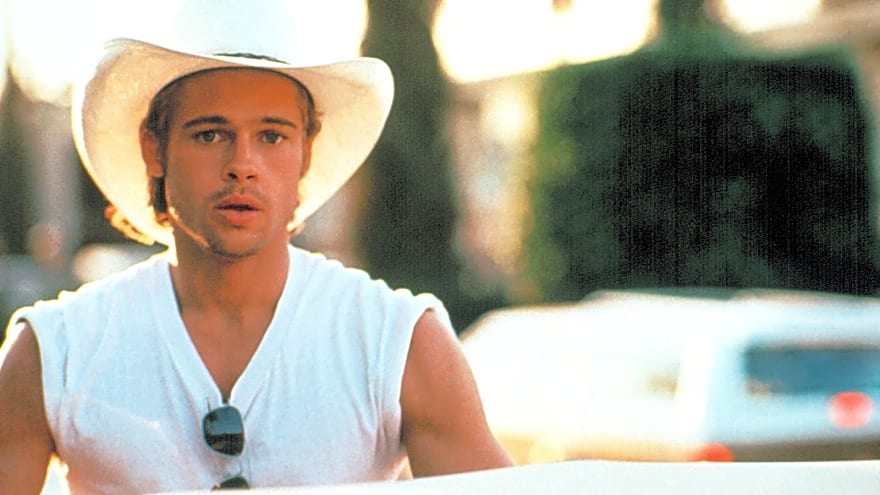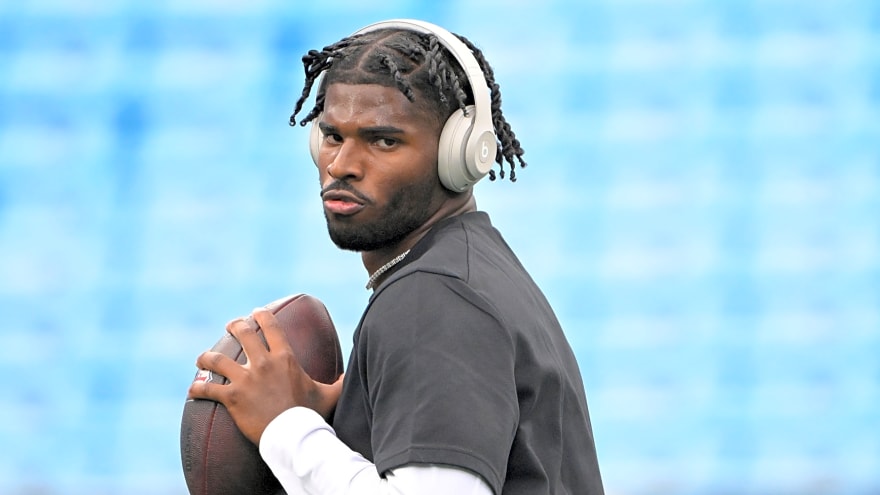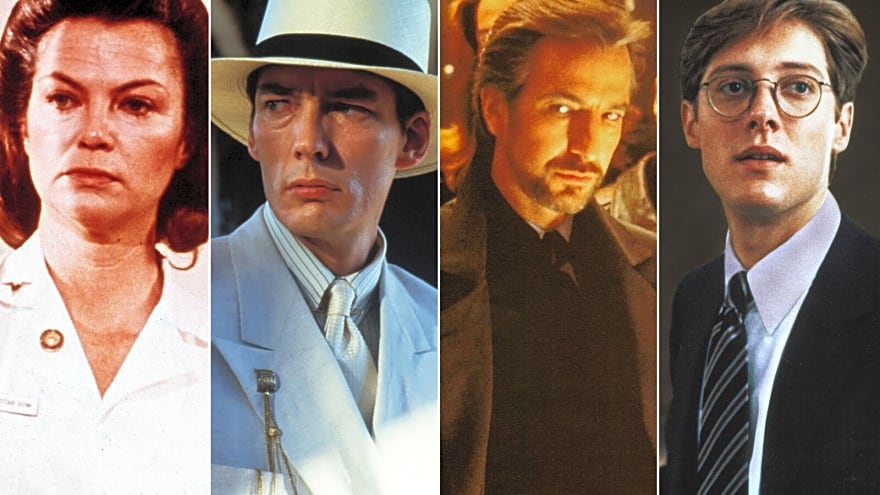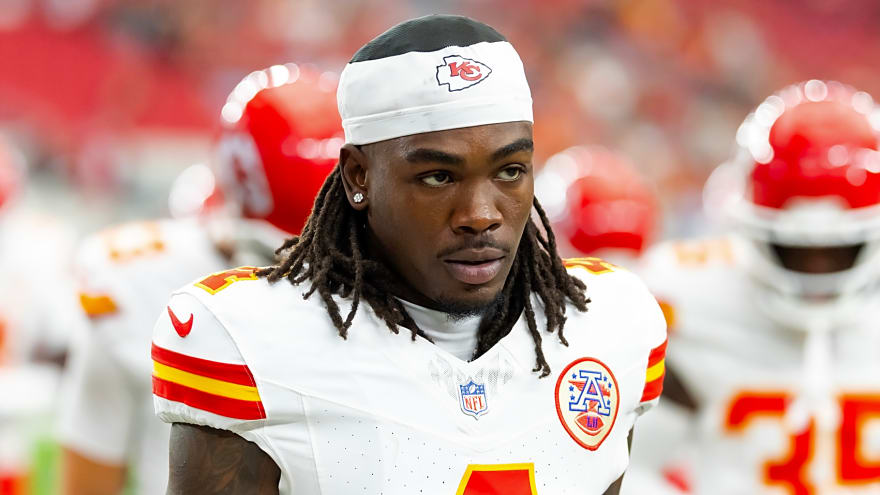
NASCAR's ever-present iron fist rears its ugly head amid latest charter drama
NASCAR has always been a family sport, but the family that runs it has always had a particular way of doing things.
You'd be hard-pressed to find another sports executive who adhered to "my way or the highway," like NASCAR founder Bill France Sr., who took extreme measures to ensure his sport came out on top in whatever battle it was waging.
History rightfully recognizes France as the man who took stock-car racing from amateur leagues to the national stage, but that doesn't mean Big Bill should be lauded as a perfect folk hero.
NASCAR's latest charter negotiations make it fun to imagine what some of the sport's pioneers would say about the situation — specifically, NASCAR's decisions — if they were still with us.
France ruled his infant sport with a largely unchecked iron fist as president. In 1950, Lee Petty had all his championship points stripped midseason after he ran races that NASCAR didn't sanction. Curtis Turner and Tim Flock were both banned from the sport entirely in 1961 for the crime of trying to organize a drivers' union, though Turner's superstardom held enough weight for France to lift his ban in 1965.
Unions would once more be the topic at the Alabama International Motor Speedway — known today as Talladega Superspeedway — in September 1969. The newly christened Professional Drivers Association (PDA) was a point of contention for France, whose contempt for unions was already well-documented.
As drivers tried to get NASCAR to postpone Talladega's debut race due to safety concerns, France's iron fist didn't waiver. The story ended with many PDA drivers — led by Richard Petty — refusing to compete in the inaugural Talladega 500 and, reportedly, a mark left by a punch from driver LeeRoy Yarbrough.
France stepped down as president in 1972, and his son, Bill Jr., succeeded him.
As the years have passed, Brian France and Jim France — Bill Jr.'s son and brother, respectively — have assumed executive roles in the sport, but Saturday was the first time in years that the sanctioning body's iron fist seemed to be brought down.
According to the Associated Press, NASCAR teams felt "threatened and coerced" into signing the new charter agreement, which runs from 2025 through 2031. Only 23XI Racing and Front Row Motorsports refused to sign the deal, with 23XI saying in a statement that "it did not have an opportunity to fairly bargain" for the new deal.
NASCAR's iron fist may have been easy to keep discreet during France Sr.'s reign when the sport was mostly regional. However, team owners' comments won't be kept quiet in the era of social media and more media personnel being on the track than ever.
Statement from 23XI ownership pic.twitter.com/z0z5rjRjEP
— 23XI Racing (@23XIRacing) September 7, 2024
If NASCAR truly threatened teams into signing the agreement, it would be a poor look for a sanctioning body constantly scrutinized by fans for a lack of transparency regarding a litany of issues, including officiating.
There's not too much to take away from that one quote aside from the obvious — it's not good that a national sporting identity like NASCAR has resorted to draconian measures when cutting deals that shape the sport — but when you look at NASCAR's first family tree, it's no surprise.
As the charter drama unfolds, one can only think what Bill France Sr. would think if he was still in charge.
More must-reads:
- NASCAR Xfinity Series playoff bubble watch: Ryan Sieg falls behind at Atlanta
- Ryan Blaney looks to defend NASCAR championship as playoff run begins
- The 'Joe Gibbs Racing winners' quiz
Breaking News
Trending News
Customize Your Newsletter
 +
+
Get the latest news and rumors, customized to your favorite sports and teams. Emailed daily. Always free!
TODAY'S BEST

Former NASCAR official sheds light on investigation, decisions during infamous 2013 'Spingate' scandal
In September 2013, one of the biggest scandals in NASCAR history took place at Richmond (Va.) Raceway. The 2013 Federated Auto Parts 400 was the final race in the 2013 Cup Series regular season. At the time, only 12 drivers made the Chase for the Sprint Cup. After a chaotic evening that saw Carl Edwards snag the win, Michael Waltrip Racing was embroiled in a massive race manipulation scandal that played a huge role in the team's eventual downfall. Clint Bowyer intentionally spun in the closing laps in an effort to help teammate Martin Truex Jr. make the chase, while Brian Vickers was told to come down pit road for the same reason. When it was all said and done, Truex Jr. was booted from the Chase and ended up leaving the team at season's end, along with longtime sponsor Napa Auto Parts. Bowyer was docked 50 points and saw his title hopes evaporate before the postseason even began and general manager Ty Norris was indefinitely suspended. Former crew chief and NASCAR Vice President of Competition, Robin Pemberton, joined the "Dale Jr. Download" on Wednesday and explained NASCAR's side of the story from that infamous evening nearly 12 years ago. "About 10 o'clock in the morning (the day after the race) the phone rings," Pemberton said. "It's (former NASCAR president) Mike Helton. He goes, 'We got frickin' trouble. We got to do an investigation.'" At the time, Chicagoland Speedway in Joliet, Illinois, hosted the first race of NASCAR's postseason as well as media week for the Chase. The spotlight was going to be firmly on the race weekend regardless of extenuating circumstances, but what followed was one of the most bizarre set of occurrences in NASCAR history. "Monday at nine or 10 o'clock, I'm on a (expletive) airplane going to Chicago," Pemberton said. "They (NASCAR) put me in a room. The TV people came in, and they replayed stuff and replayed stuff. I was in that room for eight or 10 hours the first day and probably 16 the second day." After combing through footage and radio transmissions, Pemberton came to a conclusion. "Now, you're fixing a race," Pemberton said. But the MWR scandal was not the only domino to fall in regard to the 2013 Chase. Team Penske and Front Row Motorsports — a pair of Ford teams — were also found to have participated in race manipulation, with David Gilliland intentionally slowing on a restart in order to help Joey Logano secure his spot in the postseason. While Logano remained in the playoff field, NASCAR made an unprecedented decision by adding four-time champion Jeff Gordon as a 13th driver, claiming that Gordon and the No. 24 team had been placed at a disadvantage at Richmond due to race manipulation. "It was kind of no harm, no foul," Pemberton said of the move to add Gordon to the Chase field. "He wasn't having one of his best years. But that was a decision by a few people. "What a frickin' week that was." The NASCAR Cup Series field will return to Richmond on Saturday for the penultimate race of the 2025 regular season — an event that will hopefully be devoid of race manipulation and controversy.

Pirates' longtime failure can be explained by their new prospect's shocking revelation
It's not just a lack of spending or money that keeps the Pittsburgh Pirates at the bottom of the Major League Baseball standings every year. It's also the fact that they are poorly run. Especially when it comes to player development throughout their own farm system. One of their newest prospects, catcher Rafael Flores, who was just acquired before the trade deadline in the David Bednar trade with the New York Yankees, unintentionally gave an example as to one of the flaws with the Pirates. As Flores explained to the Pittsburgh Post-Gazette this week, the Yankees' minor league focus is almost entirely on individual player development, while the Pirates — in his early view — seem more focused on team success at the minor league level. He also explained that the Yankees give their catchers every piece of information and data that they possibly can, while the Pirates only give their catchers the information that they specifically ask for. Those are two very eye-opening comparisons, and the first one is by far the most problematic and shows a very serious flaw with the Pirates' approach. The major league team should never, under any circumstances, care about the team success of a minor league team. Those teams do not exist to win games or win championships. They exist as an avenue to teach players how to play professional baseball, develop their skills and get them ready to be contributors for the major league team. Everything else is secondary. Now, Flores has only been in the Pirates system for two weeks. It is possible his initial perception is not the entire reality. But it's still an eye-opening comparison for a player to make when coming over from a completely different — and far more successful — organization. It would also track with a lot of the recent Pirates issues in developing players. They have been awful at developing position players, especially under general manager Ben Cherington, and tend to be slow to promote players through the system. (Paul Skenes was a rare exception to both issues.) It would also make sense that they want their minor league teams to do well. It makes it easy to sell hope to a frustrated fan base. If the major league team is not winning, it is easy for the Pirates to point out the success of their farm teams and say, "see, they are doing well ... there is help on the way" even if it is entirely misleading. The Pirates do have two of the best prospects in baseball in infielder Konnor Griffin and starting pitcher Bubba Chandler, but neither is currently in the major leagues. It remains to be seen if they will develop them into top-tier major leaguers. Recent history suggests the odds are not in their favor. Especially if the team is more concerned about its minor league teams winning games over individual players developing.

Mets' playoff chances in jeopardy after latest tough loss
The New York Mets have been in a slump for a couple of weeks now, and it is putting their playoff chances in some serious jeopardy. After Thursday's 4-3 loss to the Atlanta Braves, the Mets have lost 13 of their past 15 games and have seen a once-comfortable lead in the wild-card race nearly completely disappear. Following Thursday's results, the Mets have the slimmest of leads over the Cincinnati Reds for the third and final wild-card spot in the National League, sitting just 0.5 games ahead of them. It is a stunning reversal from where things were just a little more than two weeks ago. On July 27, the Mets completed a three-game sweep of the San Francisco Giants to win their seventh game in a row and improve to 62-44 on the season. They were not only six games ahead of the Reds in the playoff race, but they were on top of the National League East (holding a 1.5-game lead over the Philadelphia Phillies) and were just a half-game behind the Milwaukee Brewers for the best record in the National League. Now all of that is gone. As of Thursday night, the Mets trail the Phillies by five games in the NL East, they are 12.5 games back of the Brewers for the top spot in the NL overall and now only have half a game of cushion over the Reds. They also have the St. Louis Cardinals (3.5 back) right behind them and gaining ground. Manager Carlos Mendoza tried to remain optimistic while also acknowledging they are not playing well. The Mets' bats have been a big source of frustration during this slump, but it's not the only issue. The bullpen has also been a major problem, and key trade-deadline addition Ryan Helsley contributed to that on Thursday by giving up two runs in the top of the eighth inning to turn a 3-2 Mets lead into a 4-3 deficit. Whether it is the bats, the arms or the defense causing the problem, the common result remains the same — more losses. Now the Mets find themselves right in the thick of the playoff race, fighting for a spot. It was not that long ago that they seemed to be a playoff lock.

Spencer Jones Could Be the Yankees’ Future But Not Their Answer Right Now
Yankees fans are nothing if not consistent. If Paul Goldschmidt’s knee lands him on the injured list, the instant-reaction crowd will be screaming for Spencer Jones. You can already see the tweets: “He’s the future, call him up!” But the future doesn’t mean right now. And calling him up now would be more about hype than actual help to him or the big league club. Yes, Jones is the kind of athlete you build in a video game. He's 6’6”, runs like a wide receiver, and hits the ball into orbit. But he’s also still strikes out about a quarter of the time. That’s an improvement from the 36.8% disaster rate last year, but major league pitchers would pick at those holes until he’s swinging at shadows. That’s not the kind of learning curve you want happening on the big stage in the Bronx. Remember, it wasn't that long ago Yankees fans were screaming to bring up Anthony Volpe and now they're screaming to send him down. When Jones connects, he has phenomenal power. When he doesn’t, it’s a lot of empty trips back to the dugout. Triple-A pitchers make mistakes he can live off of. Big-league pitchers are in the big leagues because they don't make those mistakes. Hunting for a wild-card bid isn't a good time for a feast or famine rookie to feel his way through the big league. And now is not the time for Jones to be on the bench waiting to play. Judge, Cody Bellinger, and Trent Grisham have already pushed rookie Jasson Dominguez to the bench for the past three games. You’re not sitting any of those four in a pennant race to see if a prospect can adjust. If Goldschmidt’s spot opens, the Yankees’ more immediate needs are on the bench and a right-handed hitter. A versatile infielder might save you a game in October. That’s where the focus should be. Jones still has to prove he's part of the Yankees' future. It's not fair to rush him now into a part-time role. It risks hurting his confidence and his value. Let him finish the job at Triple-A. When he comes up, it should be because he’s ready to stick, not because the Yankees panicked. .




